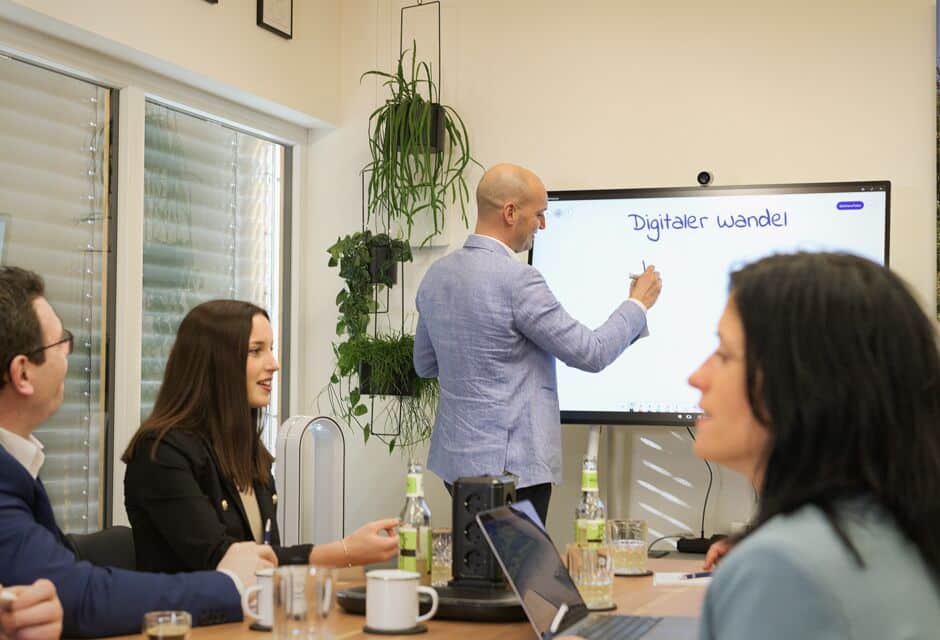Rapid change, the unknown, complexity and an increasing need for freedom among employees - digital change demands new skills from managers. Which skills are crucial? What characterizes a modern manager that employees like to follow?
Planning means staying step-by-step and flexible
Old-school managers often reach their limits in an environment of high volatility. In times when developments are difficult to predict, projects can quickly fail if team leaders stick to a single plan that employees are expected to follow under all circumstances. Many influencing factors can thwart rigid plans. So is it better to make five plans at once?
Although it is advisable to have several courses of action up your sleeve, it is more important to remain flexible and be able to react to unforeseen events. The management level should always have a larger goal or vision in mind. On the way there, it should remain open to new sub-goals or deviations.
Agile processes with short iterations are a good approach for acting in a structured and planned manner, but not too rigidly in your own projects. What does a manager need to bring to the table to fulfill this role?
Inspiring, strong-willed and determined - a role model
Think about your personal role models. Is there a manager among them - perhaps from the past - who has set a good example and motivated you to achieve new goals? If so, that's very good. Because a manager should be a role model. A team leader behaves in such a way that employees take this person seriously and follow their lead. They see the ideas and plans as sensible and positive. They are very committed to supporting the manager in implementing them.
How does a manager become a role model who sparks a vision and ignites passion for a project that everyone is passionate about?
Managers as superheroes?
In a study conducted by Google over many years, the commissioned project team "Oxygen" identified characteristics that make an ideal team leader. These include, for example, being able to coach employees, creating a safe, feel-good atmosphere, avoiding micromanagement and being productive, strategic and visionary. However, the question of a perfect manager alone is difficult. After all, a boss is still a person who has both strengths and weaknesses.
Even if a manager does not have all the skills by nature, they can train some of them and get used to them in their day-to-day work.
This includes, for example: presence. A good team leader is present and ideally shows up regularly. This is not comparable to a strict teacher in an unpopular school subject who exercised strong control and constantly admonished. Coercion and fear, triggered by authoritarian behavior, are NOT good motivators. Rather, it is about supporting employees, communicating with them and finding out what they need in order to achieve common goals.
We stick together - that's a matter of honor!
In order for line managers to gain the necessary trust of employees, they should act as a reliable and stable partner. Depending on the industry, fluctuations can always occur, triggered by an uncertain political situation, for example. These can be very stressful for everyone and have a paralyzing effect, especially when employees cannot influence the circumstances. Especially in difficult times, a manager should radiate understanding, confidence and a certain calm. Only then is it possible to continue working on the joint project in a focused manner.
It's worth it to me
How can a manager show that he or she takes the project, the joint work and the employees seriously and values them? It starts with appearance. Posture, clothing and behavior have a decisive influence on the perception of employees and customers.
Ideally, a manager shows his or her best side, just like on a date. Let's stay with the date. Would you be interested in someone and make a commitment if they turned up late for dinner in their jogging bottoms and finished their drink alone without offering you anything? You would probably be disappointed and annoyed about your wasted time. While you've put in so much effort, the other person doesn't make the slightest effort in return.
A good manager shows this effort. They recruit employees and promote the common goal that everyone involved is pursuing. By the way: In times of increasing digitalization, this also applies in particular to working from home. Managers should always be on time for online meetings, dress appropriately and show interest.
We can talk about it
This brings us to the next important point: media and communication skills. The medium is just as important as the communication itself. Managers should develop a sense of when to disseminate information by email, what to say in an (online) meeting and when a face-to-face conversation is appropriate.
Even if communication takes place digitally, it should never be one-sided. A dialog should always be possible and interaction should be possible. How can this be achieved? Simple questions are often enough, such as: "What do you need from me to complete your task?" or "What is your opinion on the project?". On the other hand, questions about other employees are counterproductive and can even kill the mood of the entire team. Suggestive questions, such as "Do you think my idea is the best?", are also rather unsuitable.
Chatting about private matters?
A trustworthy manager is characterized by authenticity. This is only possible if they show themselves as they are as a person. Even if a manager is above others in the hierarchy, small self-revelations can come across as very human and likeable. This does not have to be detailed information about your own relationship status or the illness of a relative. Of course, it is also not about making yourself vulnerable. Often all it takes is a bit of small talk or a conversation about similar hobbies or shared experiences.
A personal conversation can open the door to an encounter at eye level. Even if the roles in the professional world are clearly defined, two people meet. They always bring emotions and desires with them. It is very important to be aware of humanity again and again.
That's not what I meant - or maybe it is?
In addition to being approachable, a team player and goal-oriented, a manager should always be open to constructive criticism. After all, this shows the employee's interest and also their courage. He or she is actively contributing to the company at this moment. A team leader should always take a critical comment seriously and evaluate it. It may actually be an important impetus for improvement.
Decisive characteristics of successful managers
At the same time, the above-mentioned critical faculties mean always being open to new approaches and maintaining flexibility without losing sight of overarching goals. A good sense of interpersonal interaction and sensitivity are just as important qualities as strategic thinking, decisiveness, honesty and open-mindedness when it comes to acting as a true role model.




